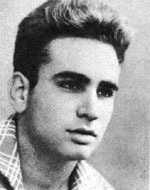Zacks, Michael (“Micha”)
Son of Shmuel (Sam) and Ruth. He was born on the 1st of Tishrei 5704 (October 1, 1943) in Tel Aviv, the youngest son of his parents, who came from America, and was considered one of the pioneers of the textile industry in Israel and the founder of the silk factory. At the agricultural school in Pardes Hanna, was a counselor in the “Noar LeNoar” organization in Ramat Gan and eventually studied at the Shenkar Textile School, where he studied mechanics in Switzerland and spent time in leisure reading books and general and professional literature. Michael, who was in Ramat Gan before the chair of the rehabilitation committee of the Israeli Association for Injured Children (“Ilan”), is willing to donate his time and strength to the union’s work. “My father has money,” he said at the time, “and he is donating money, and I want to pay tax, and my tax is unlimited help. And the boy did not fail, because he did not spare himself. He came to every committee meeting every week and was ready for any role: auxiliary classes for the injured children, support for all crutches and instruments. To accompany them on rainy days and a storm to the cinema or to any other meeting, which would make their stay in the camp pleasant, etc. – and the eyes of all the children were turned to him, for his joy and goodness captivated everyone. He even used his pocket money to buy ice cream and all sorts of sweets for the children. He enlisted in the Israel Air Force in February 1961. After his regular service, he went to reserve duty on the eve of the Six-Day War, and was once again known as the first to serve as a jeep driver. And on the third day of the battles, he encountered enemy soldiers who fired at him from the ambush, he fought valiantly and was wounded, and before he fell, he managed to kill two of the Arabs, but about eight days later, on the 16th of Sivan 5727 1967), died of his wounds. He had left a wife-and a daughter had not yet completed six months of her father’s fall. He was laid to rest in the military cemetery in Kiryat Shaul. After his death, the commander of his unit wrote a letter of condolences to his family, saying, “Without Micha and the likes of him, the air force would not have been able to achieve the wonderful achievements as expressed in its operational ability in this war. They were called upon to fulfill their duty and were pleased to serve the homeland in the first line, even when the attack continued to fight, and in spite of his being wounded, he avenged his enemy’s vengeance. ” His memory was included in the booklet “A candle in memory of the people of Ramat Hasharon who fell in the Six Day War” published by her local council
